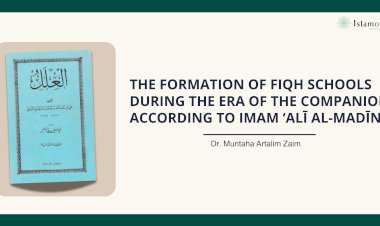The Ruling on Computer Hardware Transaction: Exploring the Shafiʿī Classical Texts
Introduction
The current technological advancements have brought about a fast-paced transformation in the commercial sector. This has resulted in a convergence between conventional Islamic law and modern commerce, which has created a set of prospects and difficulties. For an individual occupying the position of a marketing manager, comprehending the ramifications of these legal tenets on the rapidly growing computer hardware sector is of utmost importance. The present study explores the utilisation of Islamic jurisprudence, with a focus on the Selling (Bay') principle, in computer hardware transactions. The investigation is based on an analysis of the Shafiʿī classical texts. The objective of this work is to offer a thorough comprehension of the incorporation of divine laws into modern business practices, with the ultimate goal of guaranteeing transparent and mutually beneficial agreements.
Selling and buying (transaction)
In the field of jurisprudence, the concept of Bay’ or selling, is defined as the exchange of a physical commodity for something of equal value. According to Imam Ramlī of Niḥāya, this process entails providing a product or service in exchange for another product or service. In order for a transaction to be legally binding and recognized as a valid exchange of goods or services, certain conditions must be met by both parties involved. Imam al-Gazzālī outlines five crucial components that must be fulfilled for a valid transaction: the goods or services must be pure, useful, owned by the seller, able to be transferred, and fully understood by both parties. Should any of these conditions fail to be met, the transaction will not be valid.
In the realm of Islamic transactions, the concept of al-Sīgha, or official word, is an essential element. As per Islamic law, the seller must state, 'I sold you,' and the buyer acknowledges by saying, 'I bought it.' Imam al-Gazzālī, in his work al-Wajīz, regards transactions without this official word as illegal. Ibn Hajar al-Haytamī, in his work Tuḥfah, defines al-Sīgha as an explicit and well-known word among the public, signifying the buyer's ownership of the item. According to this view, computer hardware dealings lacking such formalities are deemed unlawful.
However, the concept of Mu’āṭāṭ, defined by Ibn Hajar al-Haytamī as a mutually satisfactory exchange without uttering any word, has generated scholarly debate. While the Shafi school of thought does not consider Mu’āṭāṭ as a valid transaction (Bay'), Imam Nawawī and others argue that Mu’āṭāṭ is valid in all cases where the common people deem it acceptable. This broader interpretation allows for hardware dealings without using an official word, making it easier for customers and proprietors to comply with Islamic law. In the context of e-business, defined by Kotler and Keller as a business where electronic means serve as the trading platform, the application of Islamic law is particularly relevant. Online platforms such as Flipkart.com and Amazon.com offer hardware dealings, often at a lower price compared to conventional stores. Imam Nawawī's Rawḍat al-Tālibīn discusses the legality of transactions via written communication, providing a basis for legitimizing e-business within the scope of Islamic law.
Conditions in the substance and special focus on the condition of ‘being known’
Al-Gazzālī, in his Wajīz, outlines five conditions that must be met for a particular item to be considered valid for sale: purity, utility, ownership by seller, ability to transfer, and knowledgeability. IbnHajr al-Haytami further clarifies that the fifth condition is that both the seller and buyer must have sufficient knowledge of the particular item. However, Imam al-Māwardi, in his Al-Hāwi Al-Kabīr, suggests that the transaction of an absent particular item is permissible, providing that the features of the item are described. In contrast, Imam Nawawi's Minḥāj states that observing some part is enough, as long as it implies the other parts.
In the context of computer hardware, this poses a problem for common buyers, who may not be aware of the specific details. According to the opinion of Al-Hāwi Al-Kabīr, the current trend of hardware transactions, which relies on the features described in the brochure, is legitimate. However, Imam Nawawi's reading implies that merely observing the cabinet is inadequate, and all parts of the computer, including the processor, RAM, motherboard, and more, must be seen in order to ensure accuracy. In this case, reading the BIOS may be sufficient, as it provides detailed information regarding the computer’s configuration.
Application of al-Khiyār in hardware dealing with special focus on Khiyār al-‘Ayb
The term al-Khiyār refers to a legal concept that allows the buyer to choose between accepting or rejecting a transaction or its terms. It is derived from the Arabic word 'Ikhtāra,' meaning 'to choose' and has three types: Khiyār al-Majlis, Khiyār al-Sharṭ, and Khiyār al-‘Ayb. Khiyār al-Majlis is applicable to the time of the transaction and is exhausted once the buyer leaves the place of the transaction. Khiyār al-Sharṭ applies to transactions with a time limit that does not exceed three days. Khiyār al-‘Ayb relates to the physical defects of the purchased item that were unknown to the buyer at the time of the transaction.
This part focuses on the application of Khiyār al-‘Ayb in hardware dealing. When a buyer discovers a physical defect in a purchased item, they have the right to choose between returning or keeping it. According to Imam Maḥalli, the term "old defect" refers to the defect that existed before the buyer took possession of the item. Imam Ibn Hajr adds that the loss of a special feature for which the buyer purchased the item is also considered a physical defect. Imam Nawawi's definition of Khiyār al-‘Ayb is the most useful for this study. He explains the three ways in which assumptions about a product's features can be made: the product is described as a condition, it is a custom or practice to expect a certain feature, or the seller misleads the customer. In the case of hardware dealing, Khiyār al-‘Ayb applies to the loss of features that were promised in advertisements or manuals. For example, if a laptop was advertised as having 500GB of memory but only had 200GB, the buyer has the right to return the item.
In terms of conditions related to special aims, Khiyār al-‘Ayb applies to features that affect the price of the item, such as the processor's model, monitor size, or type. The colour of the hardware or the style of the keyboard does not fall under this category. Finally, the custom or practice that may warrant Khiyār al-‘Ayb in hardware dealing refers to cases where buyers commonly expect a feature, and the seller does not deliver it. It can be challenging to determine which features fall under this category, but examples include the inclusion of a camera in a smartphone or a touch screen on a laptop. In conclusion, Khiyār al-‘Ayb is an essential legal concept in hardware dealing. It allows buyers to return items if they have discovered a physical defect or if the seller did not provide the features promised in advertisements or manuals. While determining which features fall under this category can be difficult, knowing the above criteria can help buyers make informed decisions.
The scope of Salam transaction
In Imam Nawawi's definition, Salam transaction is described as a transaction involving a liability that is exchanged for immediate cash payment. The Salam transaction is significant, as it is a common practice in various transaction areas, including computer hardware transactions. Classical texts outline the definition of Salam along with six conditions: the capital must be handed over during the transaction, the specific item is not yet present, and the location for handing over the item must be specified.
E-business can be considered a form of Salam transaction, as the buyer pays the price at the time of the transaction, and the seller (company) delivers the item to the buyer's doorstep. In this type of transaction, all the rights applicable to real transactions, such as Khiyār al-‘Ayb, would be applied. The researcher opines that including e-business under the Salam transaction category is more appropriate than classifying it under al-Mukātaba.
Application of Ḍamān al-Dark concept on the hardware dealings
In the context of Islamic law, Ḍamān al-Dark is defined by Imam al-Mawardī as "the practice of returning the price if the particular item was found owned by someone else." Imam al-Ghamrāwi further expanded this definition to include instances where the item becomes owned by someone else or is defective. Al-Ghamrāwi's definition aligns with the stance of Al-Fiqh al-Manhaj 'ala Madhhab Imam Shafi, which states that the practice guarantees the customer's price should the item be defective, cut off, or owned by another party.
The modern practice of providing guarantees and warranties can be incorporated under the concept of Ḍamān al-Dark. While the Shafi school of thought generally acknowledges the legality of Ḍamān al-Dark, specific respected figures, such as Abu al-Abbās (as cited in Majmū' by Nawawi), dispute its legitimacy. However, in Jam'al-Jawāmi', the author uses Ḍamān al-Ddark as an example for al-Qiyās, explaining that the primary reason for its legalisation is the necessity of such a tool in transactions. In the researcher's opinion, guarantees and warranties are essential for completing transactions in the current economy, and adopting a more liberal approach to the concept of Ḍamān al-Dark is appropriate under these circumstances.
References
- Abū Ḥāmid Muhammad bin Muhammad al-Gazzālī, Al-Wajīz Fi al-Fiqh al-ImamShafī’ (Beirut: ShirkathDarulArakam Bin AbiArkam, 1997).
- Ibn Hajar al-Haytamī, Tuhfathul Muhtaaj (Cairo: Dar al-Hadith, 2009).
- Abū ZakariyyaYaḥyā bin Sharafuddīn al-Nawawī, Rawḍat al-Tālibīn (Jidda: Dar Almau Al-Kutub, 2003).
- Abū Ḥasan Ali bin Muhammad bin Habīb al-Māwardi, Al-Hāwi Al-Kabīr Fi Fiqh Madhab al-Imam Shafi (Beirut: Darul Kutubul Ilmiyya, 1994).
About the author
Ashraful Khalq is PhD Scholar, Centre for Development Studies, this is taken from his PG dissertation submitted in Darul Huda Islamic University, India
Disclaimer
The views expressed in this article are the author’s own and do not necessarily mirror Islamonweb’s editorial stance.
























Leave A Comment